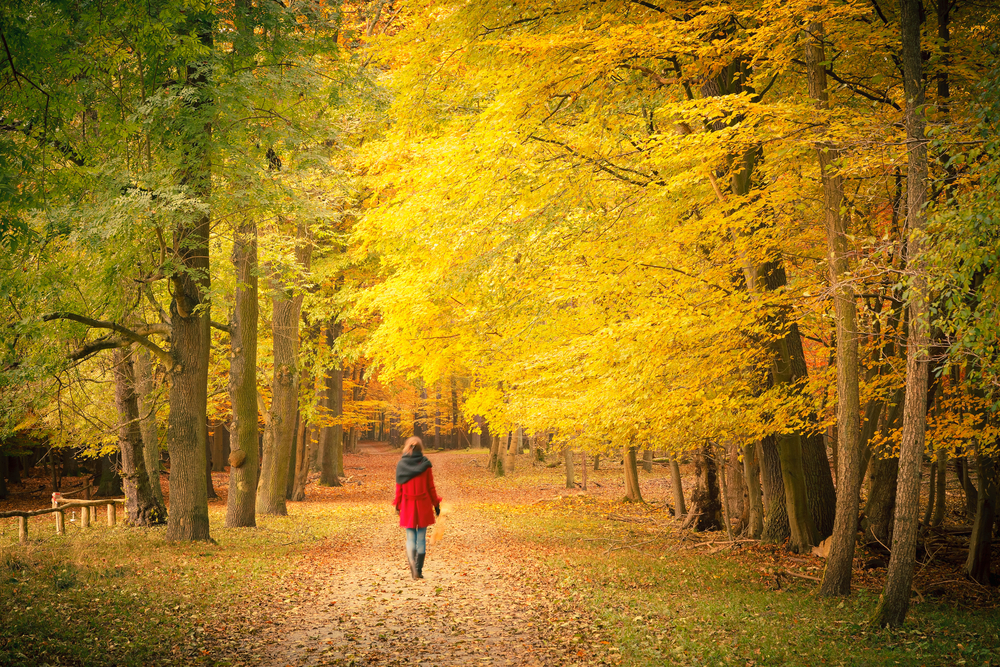We’ve all craved nature at some time or another. Maybe it was the white sands of a beach (which has its own health benefits, see our blog post titled “The Blue Mind”) that we longed for, or the calmness of a mountain camping trip. Perhaps we look forward to a hike in the woods, or a canoe trip on a river… whatever our preferences, we all desire nature at some point, and with good reason.
It seems intuitive that we like to spend time outdoors, but science has now identified some of the reasons we actually NEED time in a more natural setting. There is a term for this: Ecotherapy – that refers to the various physical and psychological benefits of being outside.
Mental Health Benefits: A 2009 study found that the closer someone lived to a green space or nature area, the healthier that person was likely to be. In fact, those who lived closest to a park, nature preserve or wooded area were less likely to suffer from anxiety or depression.
Heart & Stress Benefits: Another study found that those who spent time hiking or resting in a forest had measurably lower cortisol rates, heart rates and blood pressure. (1)
Sleep Improvements & Longevity: Other studies have found sleep improvements, better immune system function, and lower rates of stress related disorders in those who spent regular time in nature. This may be reason that regular gardeners live longer and that the ancient practice of “forest bathing” (spending time in the forest) has become popular in Japan and is sometimes even prescribed and covered by medical plans in some cases.
How Time Outdoors Makes Us Healthier
There are several factors that may contribute to the health benefits…Have you ever been cooped up indoors for an extended period of time and just felt the need to get outside? Turns out there some health reasons for this craving, including:
Vitamin D: exposure to Vitamin D produced by sunlight is responsible for many aspects of health throughout the body. Vitamin D deficiency has been linked to various types of cancer and obesity, as well as mental disorders and other health problems. While Vitamin D can be found in pill/supplement form, some people do not absorb it well and thus the outdoors is the only way to refill their Vitamin D tanks
Exercise: Most nature experiences also include some form of exercise. From rock climbing, swimming, hiking, and canoeing, most forms of outdoor activity also include movement. While we all know the benefits of exercise, most of us still aren’t getting enough exercise regularly. Spending time outdoors provides a chance for fun movement along with the other benefits of nature.
Grounding: The basic theory of grounding (which is a highly-debated idea) is that since many of us don’t come into direct skin contact with the Earth very much, a positive charge can build up in the body. Direct skin contact with the Earth acts as a “ground” just like it does for electrical outlets, reducing this extra positive charge. Proponents of grounding report that it helps reduce inflammation in the body and improve sleep quality.
Fresh Air: Indoor air is often up to 70 times more contaminated than outdoor air. With more air-tight insulation, windows and doors, and the multitude of chemicals and plastics we bring into our homes, most people come in contact with up to 6,000 chemicals regularly. Spending time outdoors is a break from indoor air pollution and outdoor air may have additional benefits as well. Outdoor air is a good source of beneficial negative ions and places like the beach and near waterfalls are especially good sources. These negative ions are also present in sunlight and after a thunderstorm, when you can smell the “freshness” in the air. Indoor air, by contrast, is deficient in negative ions and is often dry and contaminated. Negative ions are referred to as “nature’s antidepressants” and are found to have a relaxing and healing effect.
Eye Health: This is an often surprising benefit of spending time outdoors, and an increasingly important one. We are seeing an increase in vision problems, especially in children. One possible reason is the amount of time that many of us spend looking at a computer or TV screen on a daily basis. While children used to spend most of their time outdoors looking at a wide variety of colors, levels of brightness and depths, they now spend up to seven hours a day starting at a TV, computer or tablet screen with artificial light. The result is an increase in nearsightedness, even in kids who aren’t genetically predisposed to it. In fact, a study done in 2007 found that children who spent at least 2 hours a day outside were four times less likely to be nearsighted. Staring at a screen can also lead to eye fatigue, headaches, neck or back problems and other problems in adults.
Healthy Circadian Rhythm: Spending time outdoors, especially in morning sunlight, may help reduce the risk of obesity. In fact,a study at Northwestern University found that the earlier a study participant got morning sunlight, the lower the participant’s BMI. This correlation remained strong even after researchers adjusted for exercise levels, age, calorie intake and other factors that affect BMI. The reason? Getting sunlight in the morning helps keep cortisol levels and circadian rhythms in the right ranges. As little as half an hour of sun exposure before noon was enough to have an effect on reducing body weight.
Ecotherapy: The Solution
Take a long morning walk on a greenway near our home where there are plenty of trees, wildflowers and even a small waterfall. Take your children on nature walks and encourage them to spend time outdoors in the morning as well. Gardening is another great way to get time outdoors, and spending time watering plants in the morning is a great way to get morning sunlight. You can also consider booking one of EPIC Adventures’ special programs – we have programs for pre-teen girls, moms, couples, wellness retreats and more. For more information, call 1-855-5BE-EPIC or visit our website www.epiadventurestherapy.com

